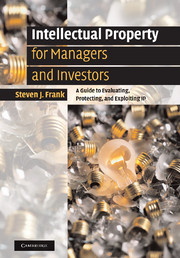 Intellectual Property for Managers and Investors
Intellectual Property for Managers and Investors 7 - Licensing and related transactions
Published online by Cambridge University Press: 06 August 2009
Summary
Licensing is the vehicle by which the IP rubber meets the commercial road, with someone else doing the driving. The idea of allowing others, even competitors, access to hard-won proprietary rights may have seemed absurd a generation ago, but today it is commonplace and a huge source of IP-driven revenue. To be sure, licensing is by no means the only way to realize value from IP; many patents thrive locked away in a safe, securing the realm against marauding technology thieves and increasing (sometimes largely constituting) a firm's asset value. But, as soon as a company or institution finds it attractive to look beyond its own capacity to monetize technology, licensing becomes inevitable.
A license is essentially a promise not to sue. You are given permission to infringe someone's IP without fear of legal repercussion. A ticket to a concert is also a license – permission to enter and listen without being thrown out unless you make too much of a pest of yourself (that is, violate the terms of the license). Unlike a concert ticket, however, an IP license is personal. Concert promoters do not care if you give your ticket to someone else. An IP owner, by contrast, does not want valuable rights falling into the wrong hands – those of her competitor, for example, or hands simply less capable of effectively exploiting the IP (for the ultimate benefit of its owner).
- Type
- Chapter
- Information
- Intellectual Property for Managers and InvestorsA Guide to Evaluating, Protecting and Exploiting IP, pp. 139 - 165Publisher: Cambridge University PressPrint publication year: 2006
